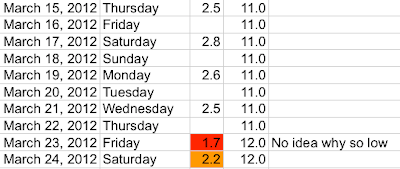I've talked before about the relationship with my calorie intake and warfarin, and here are some more conclusions and a time line.
Anyone that has ever tried to go on a calorie controlled diet will know that it inevitably becomes a low carb diet. It's almost impossible to fill your stomach and feel satisfied with food by eating carbs, so you end up eating more veg and meat.
Here is a rough timescale of how my dieting went this year, and how it affected the INR:
The whole of 2012: My average dose was 7.6mg
2012 up to January 12th: My average dose was 8.5mg
--Diet starts on January 12th. Calorie controlled, nutritionally balanced diet, low carb--
Jan 12th - Jan 31st: My average dose was 9.5mg
Throughout February: My average dose was 10.1mg
--Diet "back to normal" - eating whatever takes my fancy.
Throughout March: My average dose was 10.9mg
Throughout April: My average dose was 9.2mg
Throughout May: My average dose was 9.0mg
Throughout June: My average dose was 8.6mg
--Diet starts again... time to reduce weight a little--
I have now proactively increased my dose to anticipate a higher dose requirement on the lower calorie diet.
My conclusion of the above: Dieting in this manner has a medium-term effect on the way your liver deals with the warfarin. The dose slowly rises during the diet (over a month or two) and then slowly goes back down after you end the diet (over 3 months).
This shows just how much diet can change your dosing, and how important it is not to consider that you simply have "my average". This average can change over time.
This is further reinforcement that a self-tester should be testing regularly, and using as much knowledge as they can to anticipate correct dosing.
Anyone that has ever tried to go on a calorie controlled diet will know that it inevitably becomes a low carb diet. It's almost impossible to fill your stomach and feel satisfied with food by eating carbs, so you end up eating more veg and meat.
Here is a rough timescale of how my dieting went this year, and how it affected the INR:
The whole of 2012: My average dose was 7.6mg
2012 up to January 12th: My average dose was 8.5mg
--Diet starts on January 12th. Calorie controlled, nutritionally balanced diet, low carb--
Jan 12th - Jan 31st: My average dose was 9.5mg
Throughout February: My average dose was 10.1mg
--Diet "back to normal" - eating whatever takes my fancy.
Throughout March: My average dose was 10.9mg
Throughout April: My average dose was 9.2mg
Throughout May: My average dose was 9.0mg
Throughout June: My average dose was 8.6mg
--Diet starts again... time to reduce weight a little--
I have now proactively increased my dose to anticipate a higher dose requirement on the lower calorie diet.
My conclusion of the above: Dieting in this manner has a medium-term effect on the way your liver deals with the warfarin. The dose slowly rises during the diet (over a month or two) and then slowly goes back down after you end the diet (over 3 months).
This shows just how much diet can change your dosing, and how important it is not to consider that you simply have "my average". This average can change over time.
This is further reinforcement that a self-tester should be testing regularly, and using as much knowledge as they can to anticipate correct dosing.


